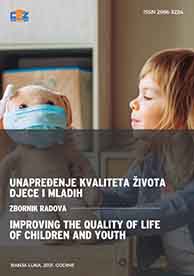ZADOVOLJSTVO ŽIVOTOM PORODICA NESTALIH OSOBA U BOSNI I HERCEGOVINI
LIFE SATISFACTION OF MISSING FAMILIES IN BOSNIA AND HERZEGOVINA
Author(s): Jagoda P. Petrović, Olivera Grbic, Marko RužičićSubject(s): Social Sciences, Psychology, Sociology, Social differentiation, Victimology, Social Norms / Social Control
Published by: CENTAR MODERNIH ZNANJA
Keywords: life satisfaction; families of missing persons; network; social work;
Summary/Abstract: In Bosnia and Herzegovina, 6,126 families are still awaiting information on the fate of their 6,586 members, who went missing during the 1992-1995 war (ICRC, 2019). Due to the disappearance of family members, many women have taken on the role of household heads. This paper presents the results of a survey of the life satisfaction of families of the missing, which is defined as a cognitive component of subjective well-being (Sousa and Lyumomirsky , 2001, according to Kovčo Vukadin, Novak and Križan, 2016). The starting hypothesis is that family members of the missing perceive a low level of life satisfaction, regardless of their sociodemographic characteristics. The questionnaire method was applied to a sample of 200 representatives of the families of the missing, proportionally represented from both entities of BiH and the Brčko District. The first part of the questionnaire consisted of questions about the socio-demographic characteristics of the respondents (gender, age, ethnicity, level of education, housing conditions, and financial opportunities). The second part of the questionnaire is the Satisfaction With Life Scale (Pavot and Diener, 1993). It consists of five statements describing different aspects of life satisfaction for which respondents expressed a degree of agreement on a scale of 1 to 7. Additional information was collected through a focus group interview with members of the Association of Families of Missing Persons. The results of the research confirmed that family members of missing persons in BiH perceive a low level of life satisfaction. The trauma of uncertain loss and years of unsuccessful search for loved ones creates a feeling of helplessness and hopelessness. In addition to taking care of providing material living conditions, the priority was the upbringing and education of children. Network social work is recommended to improve the life satisfaction of the families of the missing.
Journal: DRUŠTVENE DEVIJACIJE
- Issue Year: VI/2021
- Issue No: 6
- Page Range: 303-312
- Page Count: 10
- Language: Bosnian, Croatian, Serbian

